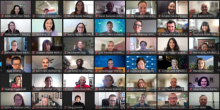
The 2022 Next Generation of NIH BRAIN Initiative Leaders: Making the Transition Workshop was held on Wednesday, October 26 and provided early-stage investigators with a place to openly discuss and ask questions about future career opportunities.
A central goal of the National Institutes of Health (NIH) BRAIN Initiative is to increase training in cutting-edge research approaches and techniques that align with the Initiative’s scientific priorities. Training mechanisms through the NIH BRAIN Initiative offer early career opportunities to ensure that the next generation of researchers has the necessary skills to lead new scientific breakthroughs, as well as provide cross-disciplinary career development opportunities to expand technical acumen.
On October 26, NIH staff held a virtual workshop convening BRAIN-supported trainees at various career stages to share their experiences and hear perspectives on transitioning to faculty positions. Participants included post-doctoral researchers, junior faculty, senior faculty, and NIH program officials. They shared career experiences and job advice, heard from those who have successfully transitioned to tenure-track faculty positions, and learned about a thriving community of next-generation BRAIN researchers. Workshop attendees included grant awardees of the NIH Blueprint Diversity Specialized Predoctoral to Postdoctoral Advancement in Neuroscience (D-SPAN) Award, the BRAIN Initiative Ruth L. Kirschstein National Research Service Award (NRSA) Individual Postdoctoral Fellowship (F32), the BRAIN Initiative Advanced Postdoctoral Career Transition Award to Promote Diversity (K99/R00), and recipients of BRAIN Initiative Research Supplements to Promote Diversity in Health-Related Research.
Following opening remarks from Dr. John Ngai, Director of the NIH BRAIN Initiative, workshop attendees heard perspectives from junior faculty on successfully navigating the job market and transitioning to their new faculty positions, including talks from Drs. Arnaldo Carreira-Rosario (Stanford), Kirstie Cummings (University of Alabama at Birmingham), and Nancy Padilla-Creano (University of Florida). In a discussion moderated by Dr. Anissa Brown, the panel discussed their individual and unique paths to obtaining their tenure-track positions, deciding when they were ready to begin the job hunt, navigating the two-body problem, and sharing their experiences interviewing for positions.
The next session featured senior faculty perspectives on hiring and included remarks from Drs. Ted Abel (University of Iowa) and Elba Serrano (New Mexico State University). In a moderated discussion with Dr. Ngai, the group discussed the importance of clearly communicating a research program, considerations when selecting an institution, as well as understanding differences in expectations between medical schools and undergraduate institutions.
Throughout the workshop, attendees split into breakout rooms for networking and small-group discussions. Additional networking sessions offered opportunities for attendees to learn about interviewing and negotiating skills, applying for career development awards and the first R01, setting up a new laboratory, transitioning from the K99 to R00, and establishing a mentor network.
For more information on the training programs offered through the NIH BRAIN Initiative, please visit the training program page.
